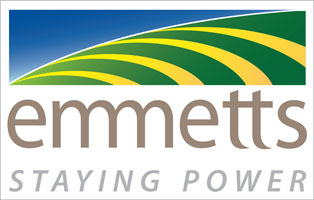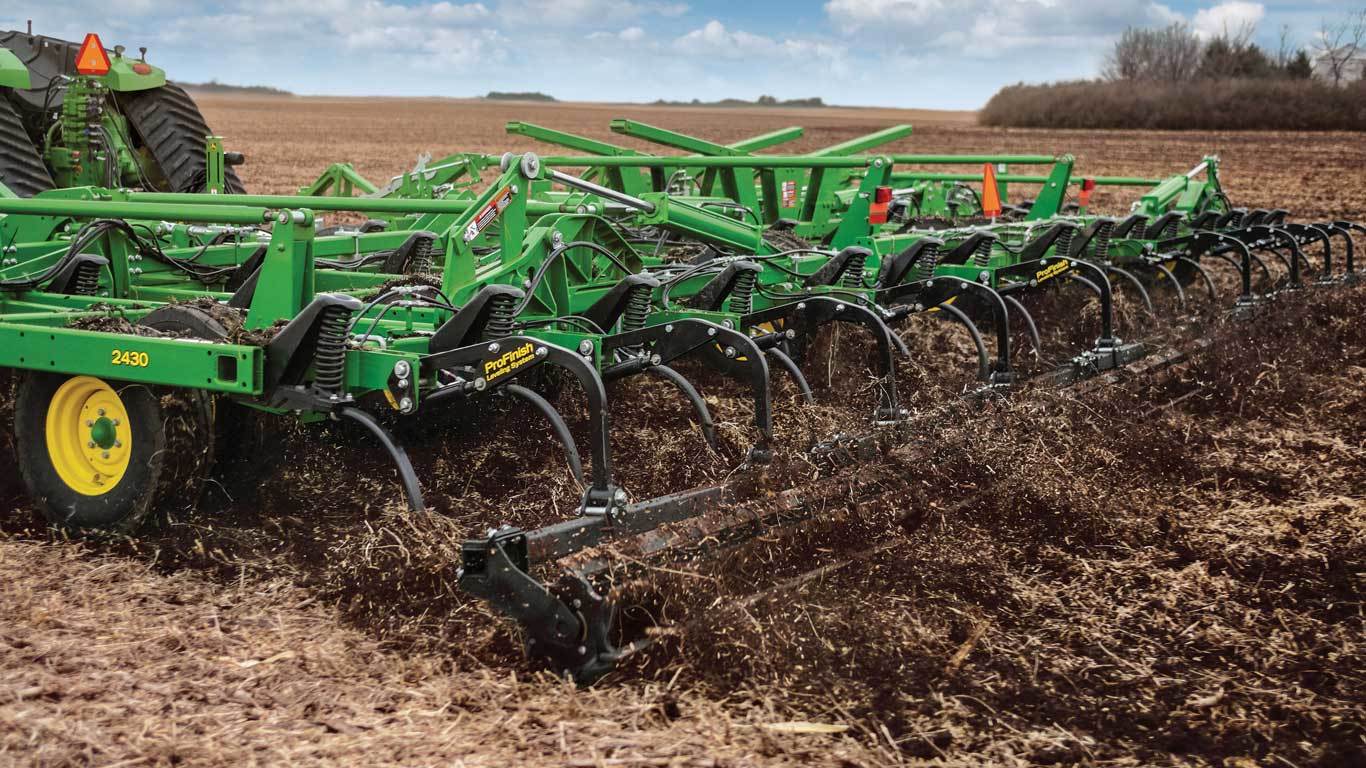
- Hydraulically-adjusted knife-edge rolling basket with internal scraper
- Adjust shank depth and rolling basket down-pressure on-the-go with exclusive TruSet™ technology
- Radial tires improve flotation and transport
- New rear hitch adjusts side-to-side for easier hookups
Features
TruSet™ Tillage technology
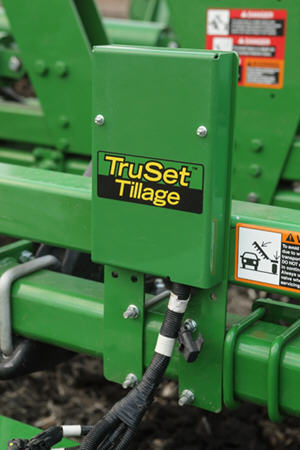
The 2430 Chisel Plow is designed for precise, accurate depth control. Precise depth control is very important for conservation of moisture, fertilizer placement, and soil management. Soil layers of differing soil type vary across farms and even across fields. The ability to adjust for these conditions is extremely important to producers today.
TruSet and single-point depth control both come as standard equipment. Both provide accurate depth control to best utilize available tractor horsepower.
With TruSet, these adjustments can be done on the move, increasing productivity and making the day go easier for operators. TruSet provides accurate and precise depth control by the use of individual wheel sensors and electronic circuitry to perform tasks of leveling and depth measurements unprecedented in the industry until now. Accurate depth is displayed to the nearest 2.5 mm (1/10 in.).
The floating hitch, frame strength of the Tube-Thru-Tube manufacturing, and the wheel package placement allow the 2430 to offer unmatched consistency of depth (front-to-back and side-to-side). Fuel can be saved, soil can be mixed and shattered, and accurate depth can be maintained. This represents true soil management for the producer.
TruSet Side-to-Side
TruSet Side-to-Side gives producers the same level of individual section control that was available with AccuDepth™ hydraulics. However, there are differences in how the two systems are hydraulically plumbed.
The AccuDepth hydraulics required a correction valve on every frame section since the hydraulics were plumbed in parallel. The TruSet system is plumbed into a single-point (series) system.
The series hydraulics give producers the option of controlling depth with just the single-point depth control valve or individually controlling each frame section with a correction valve mounted at the base of each depth control cylinder on the wings. The individual section control with TruSet Side-to-Side is an upgrade to the base TruSet Tillage system.
TruSet Side-to-Side is controlled by five sensors compared to one sensor with the base TruSet Tillage system. With the five-sensor control, the implement can make depth control adjustments via sensor feedback on the wings.
TruSet Side-to-Side eliminates the need to rephase the depth control cylinders after several rounds in the field. However, it does require another step when calibrating.
Documentation and prescription
With integrated TruSet Tillage technology, operators can incorporate documentation and prescription functionality into their tillage operations. The tillage documentation feature will give producers the ability to capture and analyze the pass for additional coverage of the crop production cycle. Prescription functionality provides producers the capability to ensure their tillage operations are executed correctly, optimizing their investment in preparing for the next crop.
Operators can document data for the depth of their sweeps along with rolling basket down pressure. By creating an as-applied map based off of global positioning system (GPS) data for the job performed by each functional area on the implement, TruSet enables producers to document their tillage passes then later review and analyze the data for future agronomic decisions.
Additionally, the TELUS Agronomy Prescription Creator company, a connected partner tool through the John Deere Operations Center, enables producers to create prescriptions for each functional area. Data from previous yields, soil surveys, or freehand drawing tools can be used to create prescriptions that will command the implement to the desired depth and pressure settings for optimum agronomic results.
TELUS Agronomy Prescription Creator is a trademark of TELUS Agriculture and Consumer Goods
Functionality by control option
| Single-point | TruSet | TruSet Side-to-Side | |
| One adjustment to change implement depth | X | X | X |
| Mechanical adjustment option | X | X | X |
| In-cab adjustment option | --- | X | X |
| In-cab individual section leveling | --- | --- | X |
| Tillage documentation and prescription | --- | X | X |
Radial tires
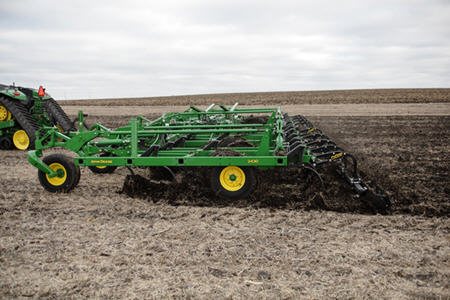
Radial tires reduce compaction points while operating in the field and minimize downtime caused by tire failures both in the field and during transportation. Radial mainframe tires now come in base equipment and can be an option on the wings. With a wider tire plate and lower inflation pressure, radial tires have a larger contact area with the ground to help minimize compaction.
Finishing components
The 2430 offers different rear attachment options to meet the unique agronomic needs of each producer. Producers have a choice of two rear attachments on the 2430 Chisel Plow.

Knife-edge hydraulic rolling basket with internal basket scraper
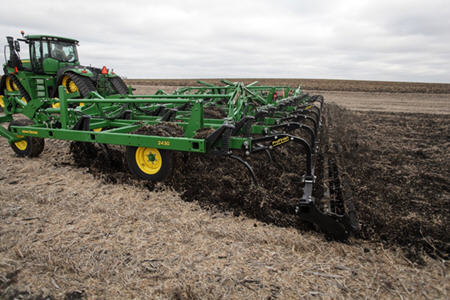 Knife-edge rolling basket for the 2430 Chisel Plow
Knife-edge rolling basket for the 2430 Chisel PlowThe knife-edge rolling basket for the 2430 Chisel Plow is made of hardened steel and handles rock strikes and adverse conditions well. The ease of down pressure adjustability allows the tool to adapt to changing field conditions. The internal basket scraper allows for a uniform field finish in wet conditions because baskets will not need to be raised out of the ground to avoid plugging; they can remain in the ground 100 percent of the time.
The John Deere 2430 Chisel Plow offers an active hydraulic rolling basket that gives the operator wide-ranging adjustability for a variety of conditions. The drawbars and rolling basket on the rear harrow are built with strength in mind for the demanding fall conditions. The system was designed to have the ability to run the rolling baskets in three different positions to finish and level the soil:
- Raised: allows the operator to raise the rolling baskets in harsh, muddy conditions
- Float: allows the operator to float the rolling baskets to lightly fluff soil
- Apply down pressure: allows the operator to adjust the basket pressure to provide consistent contact with the ground, provides a firm seedbed, and shatters root balls
The hydraulic rolling basket is offered with the knife-edge basket which is the best for heavier, wet soil.
240 Coil-Tine Chisel Plow Harrow
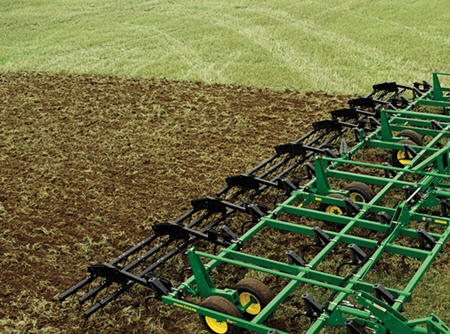 240 Coil-Tine Chisel Plow Harrow
240 Coil-Tine Chisel Plow HarrowThe 240 Coil-Tine Chisel Plow Harrow is designed specifically for the 2430 Chisel Plows. Harrow performance has grown increasingly important over the last few years as soil profile finish and residue-handling capability are on the top of the list for producers. Both of these attributes are standouts on this heavy harrow.
Internal basket scraper
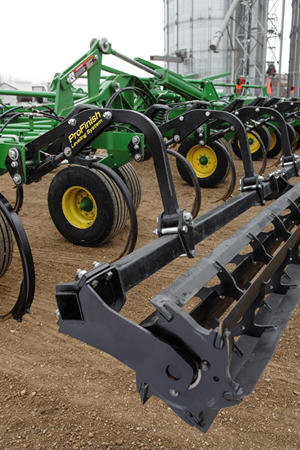
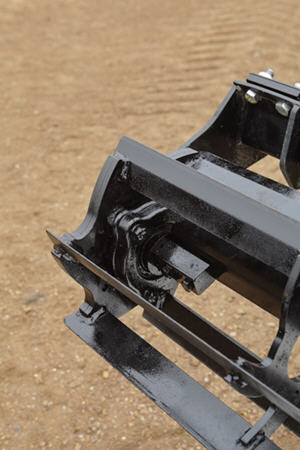
The internal basket scraper allows for a uniform field finish in wet conditions because the baskets will not need to be raised out of ground to avoid plugging and can stay in the ground 100 percent of the time.
Variety of models and sizes available
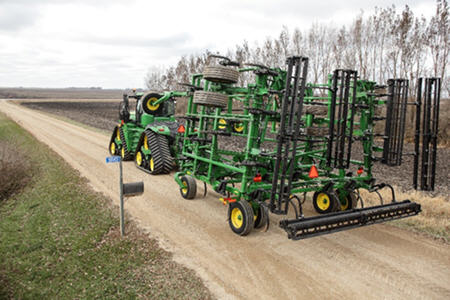 2430 Chisel Plow
2430 Chisel Plow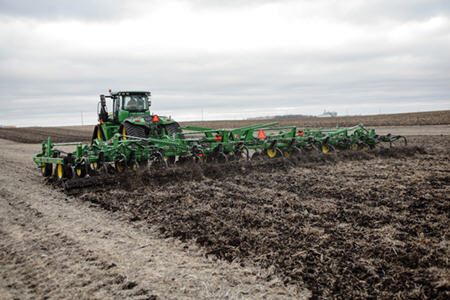 2430 Chisel Plow
2430 Chisel PlowThe 2430 Chisel Plow is available in rigid and rigid fold, three-section folding, and five-section folding frame models.
Models | Type of fold | Standards |
Rigid | Non-fold or horizontal fold | TruPosition™ or |
Flexible | Three-section | TruPosition™ or |
Flexible | Five-section | TruPosition |
Rigid configurations | ||
| Working widths | Centerframe size | Transport width |
| 3.35 m to 4.47 m (11 ft to 14 ft, 8 in.) | 3.66 m (12 ft) non-folding | 3.35 m to 4.9 m (11 ft to 16 ft) |
| 4.3 m to 5.4 m (14 ft to 17 ft, 8 in.) | 4.6 m (15 ft) non-folding | |
| 5.3 m to 6.4 m (17.5 ft to 21 ft) | 3.66 m (12 ft) folding | |
| Three-section configurations | ||
| Working widths | Centerframe size | Transport width |
| 6.4 m to 7.5 m (21 ft to 24 ft, 7 in.) | 3.05 m (10 ft) | 4.8 m (15.75 ft) |
| 7.6 m to 8.7 m (25 ft to 28 ft, 8 in.) | ||
| 7.04 m to 7.8 m (23 ft, 1 in. to 25.75 ft) | 3.66 m (12 ft) | 5.5 m (17 ft, 11 in.) |
| 8.2 m to 9.3 m (27 ft to 30 ft, 8 in.) | ||
| 9.2 m to 10.3 m (30 ft, 4 in. to 33 ft, 8 in.) | ||
| 10.7 m to 11.35 m (35 ft to 37.25 ft) | ||
| 9.14 m to 9.9 m (30 ft to 32 ft, 5 in.) | 4.6 m (15 ft) | 6.375 m (20 ft, 11 in.) |
| 10.4 m to 11.6 m (34 ft, 2 in. to 38 ft, 2 in.) | ||
| 12.2 m to 12.9 m (40 ft to 42.25 ft) | ||
| Five-section configurations | ||
| Working widths | Centerframe size | Transport width |
| 13.4 m to 14.2 m (44 ft to 46 ft, 8 in.) | 3.66 m (12 ft) | 5.3 m (17 ft, 4 in.) |
| 14.2 m to 15.2 m (46.75 ft to 50 ft) | ||
| 15.85 m to 16.7 m (52 ft to 54 ft, 8 in.) | ||
| 14.3 m to 15.2 m (46 ft, 11 in. to 49 ft, 10 in.) | 4.6 m (15 ft) | 6.1 m (20 ft) |
| 16.8 m to 17.6 m (55 ft to 57 ft, 10 in.) | ||
| 18.3 m to 19.2 m (60 ft, 2 in. to 63 ft) | ||
NOTE: Tru-Depth standards are available through 10 m (33 ft) only.
Excellent residue-handling capability
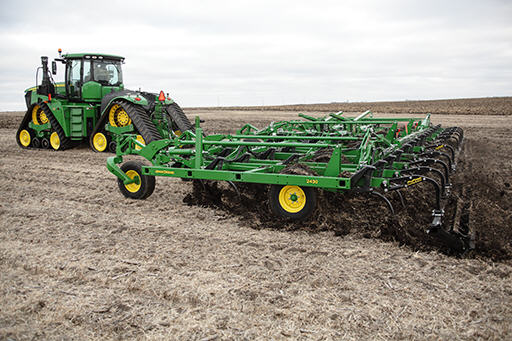 2430 Chisel Plow
2430 Chisel PlowThe 2430 Chisel Plow has excellent residue-handling capability in primary tillage at all residue levels.
Typical percentages of residue cover remaining from the 2430 are listed in the following table. The percentages do not take into account variables such as the condition of the residue, speed, and soil type.
For machines with 305-mm (12-in.) spacing:
Starting | Remaining non-fragile* | Remaining fragile** | ||||||
406-mm (16-in.) sweeps | 51-mm x 356-mm (2-in. x 14-in.) chisel point | 102-mm x 368-mm (4-in. x 14.5-in.) shovel | 406-mm (16-in.) sweeps | 51-mm x 356-mm (2-in. x 14-in.) chisel point | 51-mm x 356-mm (2-in. x 14-in.) chisel point | 406-mm (16-in.) sweeps | 51-mm x 356-mm (2-in. x 14-in.) chisel point | |
100 | 80 | 70 | 100 | 80 | 70 | 100 | 80 | 70 |
90 | 72 | 65 | 90 | 72 | 65 | 90 | 72 | 65 |
80 | 65 | 56 | 80 | 65 | 56 | 80 | 65 | 56 |
70 | 55 | 50 | 70 | 55 | 50 | 70 | 55 | 50 |
60 | 50 | 42 | 60 | 50 | 42 | 60 | 50 | 42 |
50 | 40 | 35 | 50 | 40 | 35 | 50 | 40 | 35 |
40 | 32 | 28 | 40 | 32 | 28 | 40 | 32 | 28 |
*Non-fragile residue includes crops like corn, sorghum, wheat (more than 45 bu).
**Fragile residue includes crops like soybeans, edible beans, peas, wheat (less than 45 bu), sunflower, peanuts, and cotton.
For machines with 406-mm (16-in.) spacing:
Starting | Remaining non-fragile* | Remaining fragile** | ||||||
457-mm (18-in.) sweeps | 51-mm x 356-mm (2-in. x 14-in.) chisel point | 102-mm x 368-mm (4-in. x 14.5-in.) shovel | 76-mm x 610-mm (3-in. x 24-in.) shovel | 457-mm (18-in.) sweeps | 51-mm x 356-mm (2-in. x 14-in.) chisel point | 102-mm x 368-mm (4-in. x 14.5-in.) shovel | 76-mm x 610-mm (3-in. x 24-in.) shovel | |
100 | 83 | 73 | 63 | 63 | 55 | 50 | 45 | 45 |
90 | 75 | 68 | 58 | 58 | 50 | 45 | 40 | 40 |
80 | 68 | 59 | 53 | 53 | 45 | 40 | 35 | 35 |
70 | 58 | 53 | 45 | 45 | 38 | 35 | 30 | 30 |
60 | 53 | 45 | 38 | 38 | 33 | 30 | 27 | 27 |
50 | 43 | 38 | 33 | 33 | 27 | 25 | 22 | 22 |
40 | 35 | 31 | 28 | 28 | 22 | 20 | 18 | 18 |
*Non-fragile residue includes crops like corn, sorghum, and wheat (more than 45 bu).
**Fragile residue includes crops like soybeans, edible beans, peas, wheat (under 45 bu), sunflower, peanuts, and cotton.
Proven frame construction
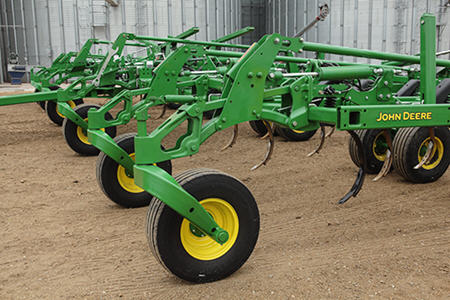 3.4-m (11.17-ft) four-bar frame
3.4-m (11.17-ft) four-bar frameOperators are requiring faster field working speeds, larger implements, and tractors because of a dramatic increase in farm size. The market is asking for and receiving tractors with more torque, more weight, and more horsepower.
Accommodating 600 engine horsepower tractors requires more from implement frame and hitch components, including thicker frame tubes, additional diagonal bracing, and frame gussets.
The frame is constructed of continuous 102-mm x 102-mm (4-in. x 4-in.) cross members inserted through 51-mm x 152-mm (2-in. x 6-in.), 76-mm x 152-mm (3-in. x 6-in.), and 102-mm x 152-mm (4-in. x 6-in.) fore-aft members. The mainframe boasts a structure made up of 102-mm x 152-mm (4-in. x 6-in.) fore-aft tubes.
The large frame member sizes, joint welds, and wheel module placement adds to the structural integrity, providing a stable front-to-rear and side-to-side operation.
Frame construction offers:
- Consistent operating depth
- Level operation
- Restricts frame dip
Walk-Over wheels help provide consistent working depth
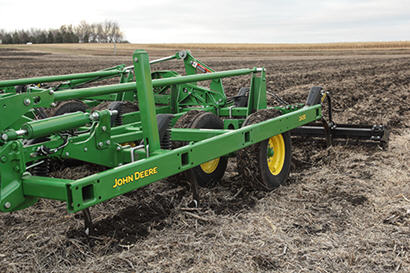 Walk-Over wheels
Walk-Over wheelsWalk-Over wheels provide a consistent working depth in uneven ground for level seedbeds and complete weed control.
The staggered wheel design provides extra room for residue flow, obstacles, and transport stability.
Wide variety of ground-engaging tools available
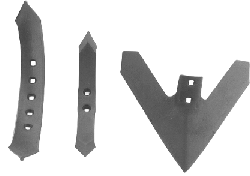 Shovels, chisels, and sweeps
Shovels, chisels, and sweeps
A wide variety of tools such as sweeps, chisels, and twisted shovels are available for the operator to maintain surface residue and ground profile under varying weather and soil conditions.
Click here to explore more about points, chisels, and sweeps.
Specifications
Key Specs
- Working widths - Rigid frame
- Option 1
3.56 to 5.28 m
11.67 to 17.33 ft
3.05 to 5.49 m
10 to 18 ft
- Transport width -Rigid frame
- Maximum depth
- Rigid, TruPosition: 20.32 cm
8 in.
TruDepth: 30.5 cm
12 in.
- Miles per hour
- 8 to 11.3 km/h
5 to 7 mph
- Horsepower per foot
- 14.7 to 24.5 kW/m
6.0 to 10 hp/ft
Rigid and TruPosition standards on spacing: 30.5 cm
12 in.
11 to 18.35 kW/m
4.5 to 7.5 hp/ft
Rigid and TruPosition standards on spacing of: 40.6 cm
16 in.
- Standard spacings - Inches
- 30.5 cm
12 in.
40.6 cm
16 in.
Fold
Working Widths
- Rigid frame
- Option 1
3.56 to 5.28 m
11.67 to 17.33 ft
- Drawn rigid fold
- Option 1
5.3 to 6.25 m
17.5 to 20.5 ft
- 3-section
- Option 1
6.65 to 8.5 m
21.83 to 28 ft
Mainframe: 3.05 m
10 ft
Option 2
7.2 to 11.79 m
23.6 to 38.7 ft
Mainframe: 3.66 m
12 ft
Option 3
9.35 to 13.1 m
30.67 to 43 ft
Mainframe: 4.57 m
15 ft
- 5-section
- Option 1
13.4 to 16.66 m
44 to 54.67 ft
Mainframe: 3.66 m
12 ft
Option 2
14.33 to 19.2 m
47 to 63 ft
Mainframe: 4.57 m
15 ft
Transport Width
- Rigid frame
- Option 1
3.05 to 5.49 m
10 to 18 ft
- Drawn rigid fold
- Option 1
3.35 to 4.88 m
11 to 16 ft
- 3-section
- Option 1
4.67 m
15.33 ft
Mainframe: 3.05 m
10 ft
Option 2
5.36 m
17.58 ft
Mainframe: 3.66 m
12 ft
Option 3
6.27 m
20.58 ft
Mainframe: 4.57 m
15 ft
- 5-section
- Option 1
5.26 m
17.25 ft
Mainframe: 3.66 m
12 ft
Option 2
Mainframe: 6.1 m
20 ft
4.57 m
15 ft
Transport Height
- Rigid frame
- Rigid over-center fold
- 3-section
- Option 1
3.3 to 4.2 m
10.83 to 13.75 ft
Mainframe: 3.05 m
10 ft
Option 2
3.28 to 5.05 m
10.75 to 16.58 ft
Mainframe: 3.66 m
12 ft
Option 3
3.89 to 5.36 m
12.75 to 17.58 ft
Mainframe: 4.57 m
15 ft
- 5-section
- Option 1
4.37 to 4.98 m
14.33 to 16.33 ft
Mainframe: 3.66 m
12 ft
Option 2
4.4 to 5.3 m
14.42 to 17.42 ft
Mainframe: 4.57 m
15 ft
Operation Depth
Operating Speed
Horsepower Required
Depth Control
- Option 1
- TruSet™ Tillage in-cab controls and single-point crank-adjust
- Option 2
- Single-point crank-adjust
- Option 3
Hydraulic Requirements
- Standard
- Option 1
- Option 2
Electrical Requirements
- Standard
- Option 1
- Option 2
Hitch
Frame
- Tubing
- High strength, box beam steel cross tubes: 10.2x10.2 cm
4x4 in.
End tubes, patented four-bar tube-through-tube frame design, welded construction: 5.08x12.7 cm
2x5 in.
- Number of ranks
- Fore-and-aft
- 340.4 cm
134 in.
- Underframe clearance
- Rigid and TruPosition: 71.1 cm
28 in.
TruDepth: 81.3 cm
32 in.
Standard Spacings
Standard Options
- Option 1
- Spec: 3.2x5.08x81.3 cm or 1.25x2x28 in.
Maximum operating depth: 30.5 cm or 12 in.
Underframe clearance: 71.1 cm or 28 in.
Spacing: TruPosition
- Option 2
- Trip height
25.4 cm
10 in.
Maximum operating depth
30.5 cm
12 in.
Underframe clearance
71.1 cm
28 in.
Spacing
30.5 cm
12 in.
40.6 cm
16 in.
TruPosition
- Option 3
- Spec
3.2x5.08x81.3 cm
1.25x2x32 in.
Trip height
27.9 cm
11 in.
Maximum operating depth
30.5 cm
12 in.
Underframe clearance
81.3 cm
32 in.
Spacing
30.5 cm
12 in.
40.6 cm
16 in.
TruDepth
- Option 4
Ground Engaging Components
Wheels
- Centerframe depth control wheels and tires
- Option 1
Drawn rigid: Castering front and Walk-Over tandem rear with six IF280/70R15 134D tires
Option 2
3-section: 6.4 to 8.7 m
21 to 28.7 ft
Center frame - 10 ft
3.05 m
Castering front with two IF280/70R15 134D tires and single rear with two IF 320/70R15 144D tires on center frames
Option 3
3-section Mainframe: 6.7 to 10.3 m
22 to 33.67 ft
Center frame: 3.7 m or 12 ft
Castering front and Walk-Over™ tandem rear with six IF 280/70R15 134D tires on center frames
Option 4
3-section: Mainframe: 10.7 to 11.4 m
35 to 37.25 ft
Center frame: 3.7 m or 12 ft
0 to 11.79 m
Castering front and Walk-Over™ tandem rear with six IF 280/70R15 134D tires on center frame
Option 5
5-section: 13.4 to 16.8 m
44 to 55 ft
Castering front and Walk-Over™ tandem rear with six IF 320/70R15 144D tires on center frame
Option 6
5-section: 18.6 m
61 ft
Castering front and Walk-Over™ tandem rear with two IF 320/70R15 144D Tires on center frames, four 285/70R19.5
- Wing frame wheels and tires
- Option 1
3-section: Six 11L-15FI load range D
Option 2
5-section: 13.4 to 16.8 m
44 to 55 ft
Castering front with two 11L-15FI load range D and Walk-Over™ tandem rear with four 12.5L-15FI load range F on inner wing frames
Castering front and Walk-Over™ tandem rear with six 11L-15FI load range D on outer wing frames
Option 3
5-section: 18.6 m
61 ft
Castering Front (2) 280/70R15 and Walk-over™ Tandem Rear with (4) 320/70R15 on Inner Wing Frames
Castering Front and Walk-over™ Tandem Rear with (6) 280/70R15 on Outer Wing Frames
- Stabilizer wheels
No Basket Harrows
- Option 1
- Option 2
- Option 3
Rolling Basket Harrow
- Option 1
- Option 2
- Option 3
Rear Hitch
- Tubing size
- Rectangular box construction: 7.62x12.7 cm
3x5 in.
- Telescoping
- Yes
- Tongue weight rating
- 45.4 kg
100 lb
- GVW
- 10,000
- Wiring harness for transport lights
- Includes Y-harness, allowing both the 2430 and towed implement lights to work simultaneously
- Hydraulic hoses and couplers
- Available as field attachment
Warranty
Additional Feature
- Opton 1
- Rear attachment options:
-Coil-tine harrow
-Hydraulic knife-edge rolling basket
- Option 2
- Option 3
- Option 4
- Option 5


